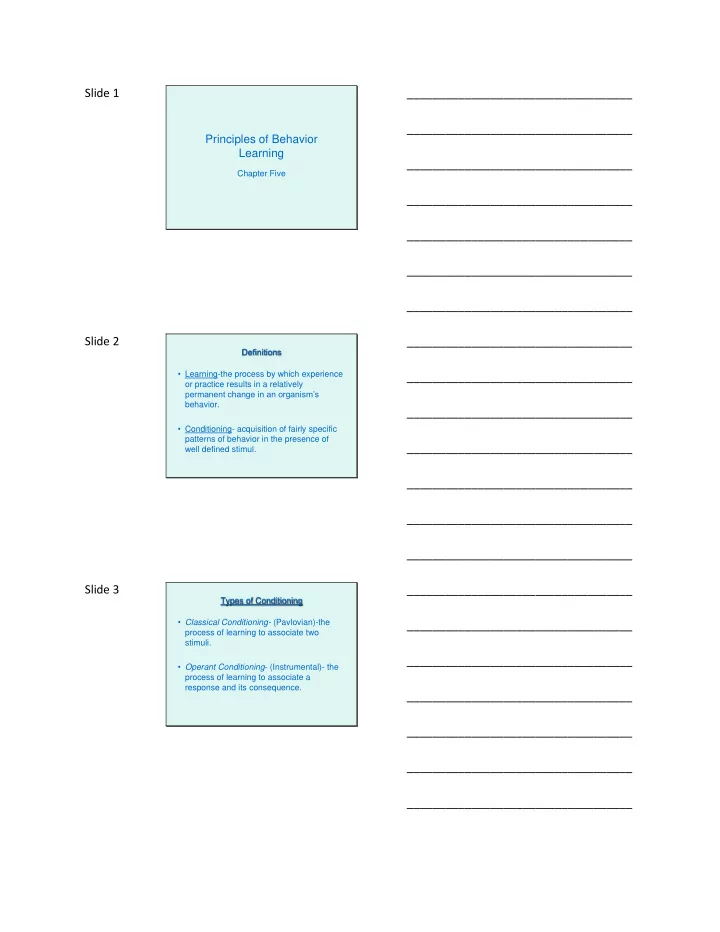

Slide 1 ___________________________________ ___________________________________ Principles of Behavior Learning ___________________________________ Chapter Five ___________________________________ ___________________________________ ___________________________________ ___________________________________ Slide 2 ___________________________________ Definitions • Learning-the process by which experience ___________________________________ or practice results in a relatively permanent change in an organism’s behavior. ___________________________________ • Conditioning- acquisition of fairly specific patterns of behavior in the presence of ___________________________________ well defined stimul. ___________________________________ ___________________________________ ___________________________________ Slide 3 ___________________________________ Types of Conditioning • Classical Conditioning- (Pavlovian)-the ___________________________________ process of learning to associate two stimuli. ___________________________________ • Operant Conditioning - (Instrumental)- the process of learning to associate a response and its consequence. ___________________________________ ___________________________________ ___________________________________ ___________________________________
Slide 4 ___________________________________ Classical Conditioning • Unconditioned Stimulus (US) ___________________________________ • Unconditioned Response (UR) • Conditioned Stimulus (CS) • Conditioned Response (CR) ___________________________________ ___________________________________ ___________________________________ ___________________________________ ___________________________________ Slide 5 ___________________________________ Before Conditioning: • Bell(CS) No Response ___________________________________ • Food (US) Salivation(UR) ___________________________________ ___________________________________ ___________________________________ ___________________________________ ___________________________________ Slide 6 ___________________________________ During Conditioning Bell followed by ___________________________________ Food (US) Salivation ___________________________________ After Conditioning Bell (CS) Salivation (CR) ___________________________________ ___________________________________ ___________________________________ ___________________________________
Slide 7 ___________________________________ Classical Conditioning in Humans ___________________________________ • Phobias • Desensitization Therapy ___________________________________ ___________________________________ ___________________________________ ___________________________________ ___________________________________ Slide 8 ___________________________________ Operant Conditioning • Involves learning association between an ___________________________________ organism’s behavior and resulting events. • Law of Effect (Thorndike) -consistently ___________________________________ rewarded behavior will be likely to recur (stamped in) while behavior that brings about discomfort will be stamped out….also known as the Principle of ___________________________________ Reinforcement. ___________________________________ ___________________________________ ___________________________________ Slide 9 ___________________________________ Types of Reinforcement • Reinforcer- a stimulus that follows a behavior, ___________________________________ increasing the likelihood that the behavior will be repeated. • Positive Reinforcer -adds something rewarding to a situation. ___________________________________ • Negative Reinforcer -removal of an aversive stimulus. NEGATIVE REINFORER ID NOT A PUNISHING EVENT…IT IS THE REMOVAL OF A ___________________________________ PUNISHING OR AVERSIVE EVENT. ___________________________________ ___________________________________ ___________________________________
Slide 10 ___________________________________ Punishment • Def. any event whose presence decreases ___________________________________ the likelihood that ongoing behavior will recur. ___________________________________ • Drawbacks to punishment ___________________________________ ___________________________________ ___________________________________ ___________________________________ Slide 11 ___________________________________ Stages involved in Conditiong: Classical & Operant • Response Acquisition -building phase of ___________________________________ conditioning during which the likelihood or strength • Classical- ___________________________________ • Operant- – Motivation – Skinner box – Shaping ___________________________________ ___________________________________ ___________________________________ ___________________________________ Slide 12 ___________________________________ • Extinction & Spontaneous Recovery- how ___________________________________ long does learning last, and once lost, can it be recovered. • Classical Conditioning- • Operant Conditioning- undergoes interference from ___________________________________ other behaviors when the original behavior is no longer rewarded. ___________________________________ ___________________________________ ___________________________________ ___________________________________
Slide 13 ___________________________________ • Generalization & Discrimination - ___________________________________ – Stimulus Generalization – Response Generalization – Stimulus Discrimination ___________________________________ – Classical Conditioning – Operant Conditioning ___________________________________ ___________________________________ ___________________________________ ___________________________________ Slide 14 ___________________________________ New Learning based on Original Learning • Classical Conditioning-Higher order ___________________________________ conditioning. • Operant Conditioning – Primary Reinforcers ___________________________________ – Secondary Reinforcers ___________________________________ ___________________________________ ___________________________________ ___________________________________ Slide 15 ___________________________________ Schedules of Reinforcement • Continuous Reinforcement ___________________________________ • Partial Reinforcement (4 schedules) – Fixed ratio -reinforce behavior after a set number of responses – Variable ratio -provide reinforcers after an unpredictable number of responses. ___________________________________ – Fixed interval - reinforce the first response afte a fixed time period. – Variable interval -reinforce the first response after varying time intervals. ___________________________________ ___________________________________ ___________________________________ ___________________________________
Slide 16 ___________________________________ Cognitive Learning • Learning that depends on mental processes that ___________________________________ are not directly observable. • Social Learning Theory • Bandura’s BoBo Doll experiment ___________________________________ ___________________________________ ___________________________________ ___________________________________ ___________________________________
Recommend
More recommend